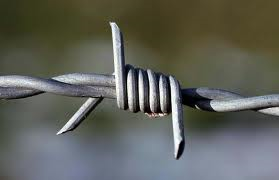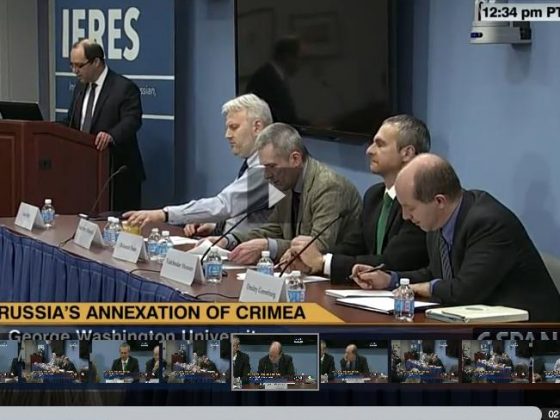I just spent a week on a study tour of Cyprus, a partitioned territory. I could not help thinking about the Crimea situation. I wondered about Kremlin rationales for incorporating a territory, Crimea, and not others, such as Transnistria, South Ossetia, or Abkhazia.
At present, the Republic of Cyprus (on the south side) is an EU/Eurozone member while the Turkish Republic of Northern Cyprus (TRNC) is only recognized by Ankara. The TRNC has suffered from a decade of international isolation. Local and international trade is hampered, there are few Western students or professors, local athletes can't compete in international tournaments, the Greek Cypriot border police often hold up northern goods (and vehicles), even just making a phone call to the other areside a of the island requires separate sim cards and long-distance rates. Divisionary loopholes have even fomented serious issues, such as human trafficking concerns.
A result of all of this is a deep identity crisis. Local opinions are split on many issues. Northerners say the root of the conflict is religious yet they consider themselves a laic society. The north wants to be part of the EU, and many deplore their over-dependence on Turkey, yet they are totally reliant on Turkey (and Turkish troops). Many local experts underline that the northern acquis is only “suspended” by the EU until a new partnership agreement is signed, yet the EU is closely associated with austerity measures, which hit Greece and Cyprus banking.
These types of issues are exactly what Russia-supported secessionist territories in post-Soviet countries might face. Being located in a gray zone of non-recognition or partial recognition, with no financial system of their own, they would have to either accept their semi-colonial status, or vacillate between Moscow and the EU – and by so doing, question their loyalty to Moscow.
When it comes to Crimea, it seems that Moscow has finally understood that the model of unrecognized statehood is unsustainable. By absorbing Crimea, Moscow's exhibited its fear of the EU policy of inciting separatist units to de-facto accept the economic rules (basically related to free trade) that Brussels offers to Moldova, Georgia and Ukraine.
Yet Turkey's experience might contain other hidden messages to Moscow. Ankara has paid a political price for their military operation in northern Cyprus. The situation is one of the key arguments against Turkish membership in the EU. We may ask, what has been Turkey's overall gain with the Cyprus situation? Actually, Turkey has never closed the doors for renegotiating the status of northern Cyprus, whereas Russia seems to have closed the door to discussions in its annexation of Crimea, thus the political price for Moscow will likely be much higher.
In the meantime, it is not only Russia, but the EU that has to draw lessons from Cyprus. One is that EU levers in divided countries should not be overrated. Thus, as I was told when I visited the EU office in Cyprus, Brussels miscalculated the degree of the Greek Cypriot's disapproval of international efforts to reunify the country, with two thirds of them having rejected the “Annan plan” in 2004.
Yet there is a more conceptual challenge for EU policy: by having accepted only southern Cyprus into the EU, Brussels de facto and indirectly legitimized the status quo. Otherwise Turkey would have been an “occupier” of an EU member state’s territory, with all of the political consequences of this. Hypothetically this situation can be extrapolated to countries like Moldova or Ukraine: if they received a clearly articulated membership perspective, the EU would have to face the same dilemma – either accept the de facto loss of separatist territories, or recognize Russia as an occupier of certain parts of EU territory.
Federalism is another issue where the EU failed regarding Cyprus. This is in spite of a strong federalist legacy in Europe that, however, can be hardly transposed to neighboring countries. Federative solutions have failed in both Moldova and Georgia, and will most likely be used by Russia in Ukraine only for debilitating its statehood.
It is very likely that the seizure of Crimea has to be put in a wider context of Russia's self-assertiveness in the Black Sea and the Eastern Mediterranean. Moscow desperately tries to strengthen its positions in Syria, Egypt, Greece, and Bulgaria – and also in Cyprus where there is a sizeable Russian diaspora, and where Russia provided a banking bailout loan. There were even ideas to locate a Russian naval base there.
Yet, after the Crimea annexation, Turkey will hardly play a mediator role as it did in the aftermath of the August 2008 Georgia war. Even with all similarities between the regimes of Recep Erdogan and Vladimir Putin, the latter can hardly count on any understanding from Ankara, which has all the reason to closely watch the repercussions of Russia’s annexation of Crimea, especially when it comes to the South Caucasus – and the conflict in Nagorno-Karabakh in particular.











